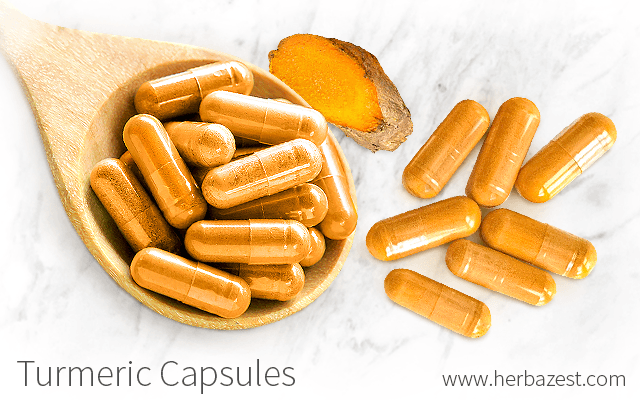Since ancient times, turmeric has been an important herb used to treat common skin ailments, digestive issues, and cardiovascular diseases. Over time, many of its traditional health benefits have been corroborated by modern science, and new forms of turmeric supplements have been developed.
Turmeric capsules are widely available and contain the powdered turmeric rhizome or root, providing a standardized, easily ingestible dosage that allows for greater absorption of its medicinal properties.
How to Make Turmeric Capsules
The convenient thing about turmeric capsules is that they can be very easily prepared at home. By no means necessary, a capsule holder can be a worthwhile investment, as it will help ensure that capsules are properly filled.
To make turmeric capsules you will need:
- Empty size No. 00 gelatin or vegetarian capsules
- High quality turmeric root powder
- Black pepper
- Capsule holder (optional)
Step-by-step process:
- Incorporate one tablespoon of ground black pepper into two cups of turmeric powder and set aside.
- If using a capsule maker or other contraption, individually arrange the opened capsules in the circular pegs until the desired quantity is achieved.
- Fill all capsules with as much powder as possible before manually securing the lids.
- Repeat steps as necessary.
While simple to make, these turmeric capsules have a shelf life of only two to three months. Daily dosage should not exceed two grams.
Buying Turmeric Capsules
There are several key factors to consider when choosing between the best turmeric capsules in the commercial arena. Keeping in mind that turmeric contains high levels of curcumin that account for much of its medicinal potency, it should therefore stand to reason that the best turmeric capsules will be the ones with the highest concentration.
THE FEDERAL DRUG ADMINISTRATION (FDA) REQUIRES COMPANIES THAT MANUFACTURE AND DISTRIBUTE TURMERIC CAPSULES TO LIST THE ACTIVE INGREDIENTS FOUND IN THEIR PRODUCTS.
Moreover, because of turmeric's low dietary bioavailability, it is recommended to find capsules that are specially-formulated with ingredients like piperine - black pepper's active ingredient - which allows for better absorption.
Turmeric capsules are widely available for purchase at many health food stores, drugstores, supermarkets, food co-ops, and anywhere dietary supplements are sold.
Benefits of Turmeric Capsules
The greatest advantage of taking turmeric capsules is that they provide a consistent dosage. While a standard turmeric capsule dosage can address a wide range of specific health conditions, some side effects related to overuse include nausea, bloating, abdominal pain, diarrhea, and indigestion in sensitive individuals.
COMPACT AND CONVENIENT, THEY ELIMINATE THE NEED TO INCLUDE BULK TURMERIC INTO CULINARY AND MEDICINAL PREPARATIONS.
Relief from pain and inflammation are among the most widely-reported health benefits of turmeric capsules. In cases of rheumatoid arthritis, for example, the use of turmeric capsules have been shown to greatly reduce joint inflammation and tenderness while improving overall functionality.1
With a powerful antioxidant mechanism, turmeric capsules promote healthy skin and cells, and they are also used for treating gastrointestinal ailments such as gallstones, gastritis, and irritable bowel syndrome.2,3 Additionally, patients suffering from diabetes or liver complications can also benefit from treatment with turmeric capsules, which regulate blood sugar levels in the body and stimulate bile excretion.4,5
Turmeric capsules are a great way to reap the numerous health benefits of turmeric, are readily available throughout the commercial market, and can even be made at home. Talk with a family physician to determine the best turmeric capsules for you.
Sources
- Herbal Medicine: Biomolecular and Clinical Aspects, Chapter 13: Turmeric, the golden spice, 2011
- How Not to Die: Discover the foods scientifically proven to prevent and reverse disease
- National Institutes of Health, Herbs at a Glance, Turmeric
- The International Journal of Biochemistry & Cell Biology, Potential therapeutic effects of curcumin, the anti-inflammatory agent, against neurodegenerative, cardiovascular, pulmonary, metabolic, autoimmune and neoplastic diseases, 2009
- The United States Pharmacopeial Convention, Pharmacopeial Forum, 2009
- Food and Drug Administration, Tips for dietary supplement users
Footnotes:
- Journal of Alternative and Complementary Medicine. (2009). Efficacy and safety of Curcuma domestica extracts in patients with knee osteoarthritis. Retrieved September 23, 2021, from: https://pubmed.ncbi.nlm.nih.gov/19678780/
- Chemical and Pharmaceutical Bulletin. (1985). Natural antioxidants. III. Antioxidative components isolated from rhizome of Curcuma longa L. Retrieved October 12, 2021, from: https://www.jstage.jst.go.jp/article/cpb1958/33/4/33_4_1725/_pdf
- Lipids in health and Disease. (2015). Combination of curcumin and piperine prevents formation of gallstones in C57BL6 mice fed on lithogenic diet: whether NPC1L1/SREBP2 participates in this process? Retrieved October 12, 2021, from: https://www.ncbi.nlm.nih.gov/pmc/articles/PMC4557223/
- Journal of Agricultural and Food Chemistry. (2005). Curcuminoids and sesquiterpenoids in turmeric (Curcuma longa L.) suppress an increase in blood glucose level in type 2 diabetic KK-Ay mice. Retrieved September 23, 2021, from: https://pubs.acs.org/doi/10.1021/jf0483873
- Journal of Food Science. (2016). Choleretic activity of turmeric and its active ingredients. Retrieved September 16, 2016, from: https://europepmc.org/article/med/27228476




